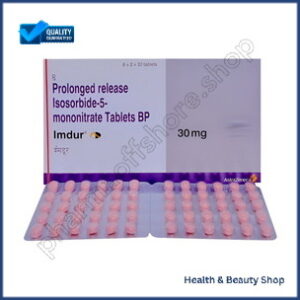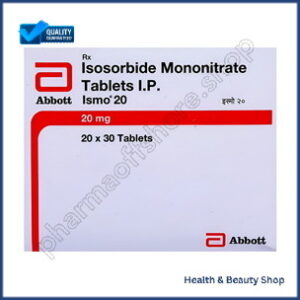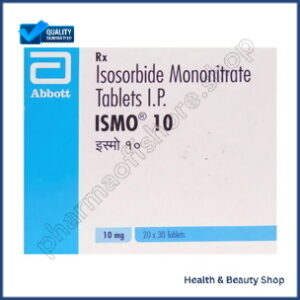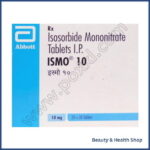ADDICTION
ALCOHOL DEPENDENCE
QUIT SMOKING
ALLERGY
ANTI FUNGAL
FUNGAL INFECTION
FUNGAL NAIL INFECTIONS
ANTI-REJECTION DRUGS
ANTI WORM
ANTIBIOTIC
BACTERIAL INFECTIONS
ARTHRITIS
GOUT
OSTEOARTHRITIS
RHEUMATOID ARTHRITIS
BLOOD
LOW PLATELET COUNT
THROMBOPHLEBITIS
VARICOSE VEINS
COLON
ANAL FISSURE
PILES
ULCERATIVE COLITIS
DIABETES CARE
DIABETES INSIPIDUS
DIABETES TYPE
DIABETIC FOOT ULCERS
GLUCOSE MONITOR
EYES/EAR CARE
DRY EYES
EYE CARE
EYE EXAMINATION
EYE INFECTION
EYE LASHES
EYE PAIN
GLAUCOMA
OCULAR HYPERTENSION
UVEITIS
FEVER CARE
MALARIA
RHEUMATIC FEVER
TYPHOID FEVER
GASTROINTESTINAL
ACIDITY
CONSTIPATION
CROHN'S DISEASE
DIARRHOEA
GALLBLADDER STONES
INTESTINAL ULCERS
IRRITABLE BOWEL SYNDROME
MOTION SICKNESS
NAUSEA
Sorbitrate (Isosorbide Dinitrate)
Sorbitrate 5 mg (Isosorbide Dinitrate)
Sorbitrate 10 mg (Isosorbide Dinitrate)
| Active Ingredient (Generic Name): | Isosorbide Dinitrate |
|---|---|
| Indication: | Chest pain (Angina), Heart failure |
| Manufacturer | Abbott India Pvt Ltd |
| Packaging: | 50 pills in one bottle |
From: $44.00
Sorbitrate, or Isosorbide Dinitrate, widens blood vessels to increase blood flow, reducing the heart’s workload and improving oxygen delivery to the heart. It treats angina by easing chest pain and lowering blood pressure, benefiting heart health. Follow your healthcare provider’s dosage instructions with water, avoid using it during an angina episode’s start, and maintain a consistent schedule. It may also help heart failure and certain high blood pressure types but consult for proper usage. Consider factors like pricing structures and quality when buying. Understanding its uses and administration can optimize your health and financial decisions.
Starting your discussion on the effectiveness of Sorbitrate can provide valuable insights into its mechanism of action and potential benefits. Sorbitrate, also known as isosorbide dinitrate, is a medication commonly used to treat angina pectoris, a condition characterized by chest pain or discomfort due to coronary artery disease. The primary way Sorbitrate works is by dilating the blood vessels, which helps to increase blood flow and oxygen delivery to the heart muscle. By doing so, Sorbitrate reduces the workload on the heart and decreases the oxygen demand, ultimately relieving angina symptoms.
It is important to note that Sorbitrate is a vasodilator, meaning it relaxes and widens the blood vessels. This action leads to decreased blood pressure, making it a useful medication for managing hypertension as well. By improving blood flow and reducing the heart’s workload, Sorbitrate plays a vital role in enhancing cardiovascular health and alleviating symptoms associated with heart conditions. Talk to your healthcare provider to learn more about the effectiveness of Sorbitrate in managing your specific condition.
Benefits of Sorbitrate Medication
Sorbitrate medication offers significant relief by dilating blood vessels to enhance blood flow and reduce the heart’s workload, ultimately improving cardiovascular health. By dilating the blood vessels, Sorbitrate helps to increase the supply of oxygen and nutrients to the heart muscle, which is essential for its proper functioning.
This improved blood flow can alleviate chest pain (angina) and reduce the frequency and severity of angina attacks. Additionally, Sorbitrate can help lower blood pressure, making it beneficial for individuals with hypertension. By reducing the heart’s workload, Sorbitrate aids in improving overall heart function and can enhance exercise tolerance in individuals with heart conditions.
The medication’s ability to dilate blood vessels also supports better circulation throughout the body, which can have positive effects on various organs and tissues. Overall, Sorbitrate medication plays a crucial role in managing cardiovascular conditions and promoting better heart health.
Why is this medication prescribed?
If you’re experiencing chest pain or hypertension, your healthcare provider may prescribe Sorbitrate to help widen your blood vessels, improve blood flow, and reduce your heart’s workload. Isosorbide dinitrate, the active ingredient in Sorbitrate, belongs to a class of medications called nitrates.
Nitrates work by relaxing and expanding the blood vessels in your body, allowing blood to flow more easily and reducing the strain on your heart. By widening the blood vessels, Sorbitrate increases the supply of oxygen and blood to the heart muscle, which can help alleviate chest pain (angina) and lower blood pressure in individuals with hypertension.
This medication is commonly used to prevent or relieve angina attacks, treat heart failure, and manage high blood pressure. It’s important to follow your healthcare provider’s instructions carefully when taking Sorbitrate to ensure you obtain the maximum benefit from the medication and minimize the risk of potential side effects.
How should this medicine be used?
To use this medicine effectively, follow the dosage instructions provided by your healthcare provider. Isosorbide dinitrate, commonly known as Sorbitrate, is usually taken two to three times a day with a full glass of water. It’s important to take this medication exactly as prescribed to achieve the best results. Your healthcare provider will determine the appropriate dosage based on your medical condition and response to treatment. Don’t increase or decrease your dose without consulting your doctor first.
Isosorbide dinitrate is typically used to prevent chest pain (angina) and shouldn’t be used to relieve an episode of angina that has already begun. If you’re using the extended-release tablets, don’t crush or chew them; swallow them whole. It’s essential to keep track of your medication schedule and take Sorbitrate at the same times each day to maintain a consistent level of the drug in your body. If you have any questions or concerns about how to use this medication, don’t hesitate to consult your healthcare provider for clarification.
Other uses for this medicine
For conditions other than angina, Isosorbide dinitrate may also be prescribed by your healthcare provider.
While Isosorbide dinitrate is primarily used to prevent chest pain due to angina, it can also have other medical applications. Some individuals with heart failure may benefit from Isosorbide dinitrate as part of their treatment plan.
This medication works by dilating blood vessels, reducing the heart’s workload, and improving blood flow, which can be advantageous for certain heart conditions. Additionally, Isosorbide dinitrate might be recommended for individuals with certain types of high blood pressure to help relax and widen blood vessels, facilitating better blood circulation.
It’s essential to follow your healthcare provider’s instructions precisely when using Isosorbide dinitrate for conditions other than angina, as the dosage and frequency may differ from its angina-related use.
Always consult your healthcare provider for guidance on the appropriate use of Isosorbide dinitrate for your specific medical condition.
What special precautions should I follow?
Before beginning Sorbitrate (Isosorbide Dinitrate), it’s essential to thoroughly examine your medical history. This step guarantees that you and your healthcare provider have a thorough understanding of any conditions or medications that may interact with Sorbitrate.
Check Medical History Thoroughly
Conduct a thorough examination of your medical history to identify any conditions or factors that may influence the use of Sorbitrate (Isosorbide Dinitrate). When evaluating Sorbitrate, it’s crucial to take into account various aspects of your medical background. Here are some critical points to assess:
- Cardiovascular Conditions: Evaluate any history of low blood pressure or recent heart attacks.
- Allergies: Note any known allergies to nitrates or related medications.
- Liver or Kidney Problems: Assess the functioning of these organs as Sorbitrate may impact their effectiveness.
- Pregnancy or Breastfeeding: Consult your healthcare provider if you’re pregnant or nursing to determine the safety of Sorbitrate use.
What special dietary instructions should I follow?
When managing your dietary intake while taking Sorbitrate (Isosorbide Dinitrate), consider reducing your sodium consumption to help optimize its effectiveness. High sodium levels can lead to fluid retention, which may counteract the benefits of Sorbitrate.
Opt for fresh fruits and vegetables, lean proteins, and whole grains to promote a heart-healthy diet. Additionally, limit processed foods, canned soups, and fast food, as these are often high in sodium. Be mindful of added salt in cooking and at the table, opting for herbs and spices for flavor instead.
Drinking plenty of water can also help flush out excess sodium from your body. Furthermore, alcohol consumption should be moderated while taking Sorbitrate, as it can interact with the medication and lead to increased side effects.
What should I do if I forget a dose?
If you overlook a dose of Sorbitrate (Isosorbide Dinitrate), take it as soon as you recall, unless it’s nearly time for your next scheduled dose. If it’s close to the time for your next dose, skip the missed dose and continue with your usual dosing schedule. Don’t take an extra dose to compensate for the one you missed, as this can increase the risk of side effects.
It’s vital to maintain a consistent dosing schedule to guarantee the medication works effectively in managing your condition. Setting reminders or integrating taking your medication into a daily routine can help you recall to take Sorbitrate as prescribed. If you frequently forget doses, consider using a pill organizer or setting alarms to help you remain on track with your medication regimen.
Always consult your healthcare provider if you have questions or concerns about missed doses or the proper administration of Sorbitrate.
What side effects can this medication cause?
When taking Sorbitrate (Isosorbide Dinitrate), it’s important to be aware of potential side effects. Some side effects can be serious and may require immediate medical attention.
If you notice any persistent or worsening symptoms, contact your doctor promptly.
Persistent or Worsening Side Effects
To understand the potential side effects of Sorbitrate (Isosorbide Dinitrate), it’s essential to be aware of the common adverse reactions that may persist or worsen during treatment.
Some side effects you may experience include:
- Headaches: You might continue to have headaches as your body adjusts to the medication.
- Dizziness: This side effect can worsen, especially when standing up quickly.
- Flushing: Persistent redness of the skin may occur, but usually diminishes over time.
- Nausea: Some individuals may experience ongoing feelings of nausea, which could impact daily activities.
Some side effects can be serious. If you experience any of the following symptoms, call your doctor immediately:
In case you experience any of the following symptoms, promptly contact your doctor as some side effects of Sorbitrate (Isosorbide Dinitrate) can be serious.
- Severe headache: Persistent and intense headaches could indicate a severe reaction to the medication.
- Dizziness or lightheadedness: Feeling excessively dizzy or lightheaded may signal a drop in blood pressure.
- Fainting spells: Sudden episodes of fainting require immediate medical attention.
- Rapid heartbeat: If you notice a significant increase in your heart rate, seek medical help promptly.
What should I know about the storage and disposal of this medication?
Keep Sorbitrate (Isosorbide Dinitrate) in a cool, dry place away from direct sunlight and moisture to maintain its effectiveness. Maintain the medication in its original container with the lid tightly closed. Avoid storing it in the bathroom or kitchen, where humidity levels can fluctuate.
Make sure that Sorbitrate is out of reach of children and pets, as it can be harmful if ingested accidentally. Check the expiration date on the packaging and dispose of any expired medication properly. Don’t flush Sorbitrate down the toilet or throw it in the trash. Instead, consult with your pharmacist or local waste disposal facility on the correct method of disposal.
It’s vital to follow these storage and disposal guidelines to ensure the medication remains potent and to prevent any potential harm to individuals or the environment. If you have any questions or concerns about storing or disposing of Sorbitrate, consult your healthcare provider or pharmacist for guidance.
In case of an emergency/overdose
If an emergency or overdose occurs with Sorbitrate (Isosorbide Dinitrate), promptly seek medical assistance by contacting poison control or calling emergency services. In case of an overdose, symptoms may include severe headache, dizziness, fainting, rapid heartbeat, and vomiting. It’s essential to provide medical professionals with details about the amount of medication taken and the time of ingestion.
While waiting for help to arrive, keep the individual calm and monitor their essential signs. Don’t induce vomiting unless instructed by medical personnel. If the person is unconscious, check their breathing and perform CPR if necessary. Avoid giving anything to drink unless advised by a healthcare provider.
When seeking medical assistance, bring the Sorbitrate container with you to provide critical information to the healthcare team. Don’t delay in getting help, as overdosing on Sorbitrate can be life-threatening. Follow the instructions given by the medical professionals carefully for the best outcome.
What other information should I know?
To further comprehend Sorbitrate (Isosorbide Dinitrate) and guarantee safe usage, acquaint yourself with additional pertinent information. It’s vital to inform your healthcare provider about any allergies, medical conditions, or medications you’re currently taking before starting Sorbitrate. This includes over-the-counter drugs, vitamins, and supplements, as they may interact with Isosorbide Dinitrate, impacting its effectiveness or causing unwanted side effects.
Avoid consuming alcohol while using Sorbitrate, as it can increase the risk of low blood pressure and dizziness. Additionally, be cautious when rising from a sitting or lying position to prevent sudden drops in blood pressure that could lead to fainting.
It is essential to follow the prescribed dosage and schedule provided by your doctor. Don’t stop taking Sorbitrate abruptly without consulting your healthcare provider, as this could lead to worsening of your condition. Keep all appointments for monitoring and dose adjustments as recommended by your healthcare team to ensure the medication is working effectively and safely for you.
Brand names
When considering brand names for Isosorbide Dinitrate, familiarize yourself with the various options available in the market. Isosorbide Dinitrate is a medication used to prevent chest pain (angina) in people with a certain heart condition. Below is a table highlighting some common brand names for Isosorbide Dinitrate:
| Brand Name | Manufacturer |
|---|---|
| Isordil | Pfizer |
| Dilatrate-SR | Schwarz Pharma |
| Isochron | Duramed Pharmaceuticals |
| Isoket | Recordati Pharma |
| IsoDitrate | Aspen Pharmacare |
These brand names may vary depending on your location and the specific pharmaceutical company producing the medication. Consult with your healthcare provider to determine the most suitable brand of Isosorbide Dinitrate for your condition. Understanding the different brand names can help you make informed decisions about your medication and ensure you receive the appropriate treatment for your angina symptoms.
Purchase Locations and Prices
Exploring various purchase locations and comparing prices for Isosorbide Dinitrate can help you make cost-effective decisions regarding your medication. Isosorbide Dinitrate, commonly known as Sorbitrate, can be found in both physical pharmacies and online stores. Local pharmacies like CVS, Walgreens, or Rite Aid often carry this medication and may offer convenience if you need it urgently. However, prices can vary between different pharmacies, so it’s advisable to call ahead and compare costs before making a purchase.
Alternatively, online pharmacies and websites like HealthWarehouse.com or GoodRx.com may provide competitive pricing and the convenience of home delivery. When buying online, make sure the pharmacy is reputable and licensed to guarantee the quality and authenticity of the medication. Some online pharmacies may also offer discounts or coupons that can help reduce the overall cost. Remember to factor in shipping fees and delivery times when considering online purchases.
To summarise
Comparing prices at different purchase locations for Isosorbide Dinitrate can help you make informed and cost-effective decisions about your medication. By exploring various options such as local pharmacies, online retailers, and discount programs, you can find the best deal that suits your budget and healthcare needs.
Understanding the pricing structures, discounts, and potential insurance coverage available at different outlets can greatly impact your overall medication expenses. Additionally, considering factors like shipping costs, convenience, and reliability when purchasing Isosorbide Dinitrate is vital for a seamless medication management experience.
It’s important to weigh the pros and cons of each purchase location to make sure you’re getting the most value for your money without compromising on quality or service. Taking the time to compare prices and evaluate different buying options empowers you to take control of your healthcare spending while receiving the necessary treatment for your condition.
Be proactive in your medication purchasing decisions to optimize both your health outcomes and financial well-being.










